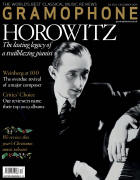Texte paru dans: / Appeared in: |
|
|
Outil de traduction (Très approximatif) |
|
|
Reviewer:
David Vickers Barbara Strozzi (1619-77) published eight collections of chamber vocal music – almost all secular and most of them extant (Op 4 is lost). Although a range of her extraordinary music forms the bulk of numerous albums by eminent singers, many of these are long out of print and some currently fetch silly money secondhand. It is baffling that no artist has ever launched a coherent attempt to record her complete works. In conjunction with Henry Bauckham’s new play Her Father’s Voice (a dramatisation of Strozzi’s life drawing from original eyewitness accounts), the Fieri Consort offer a glimpse into the sophisticated union of poetry and harmony that the Venetian created for her performances at the Accademia degli Unisoni. Ten diverse pieces are cherry-picked from Strozzi’s madrigals, duets and cantatas (Opp 1, 2, 3, 6 and 7). The singing has highly effective clarity and sincerity, and is accompanied with tasteful discretion and precision by a revolving continuo trio of theorbist Toby Carr (sometimes swapping over to guitar), harpist Aileen Henry and gambist Harry Buckoke. Two solo cantatas conveying the weeping of forsaken lovers are sung by sopranos Lucinda Cox (L’eraclito amoroso) and Hannah Ely (Lagrime mie) with bittersweet eloquence. In the duets, Ely and Cox convey eroticism of musical nuances and poetry eloquently (Begli occhi), tenors Josh Cooter and Tom Kelly bewail the burning sensations of thankless love (Al battitor di bronzo della sua crudelissima dama), and the sunnier rejuvenating experience of felicitous love is expressed cheerfully by Cox and Kelly (Il ritorno). A broader context of secular chamber music-making in Venice is illustrated by Monteverdi’s lovely strophic song Sì dolce è’l tormento (published 1624), Nicolò Fontei’s duet Dio ti salvi pastor (1636) and Benedetto Ferrari’s witty ciacona Amanti io vi so dire (1641) – all three composers were friends of Strozzi’s father. There are also brief instrumental interludes by several composers, including five pieces from Kapsperger’s Libro quarto d’intavolutura di chitarrone (1640). It is a nice touch that this timely celebration of Strozzi’s quatercentenary ends with her soprano-free trio madrigal Voi sete, o begli occhi, sung tenderly by alto (Nancy Cole), tenor (Kelly) and bass (Ben McKee). |
|




